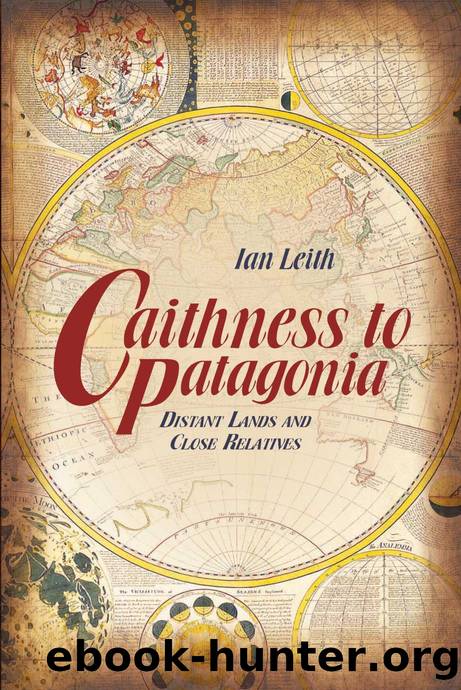Caithness to Patagonia by Ian Leith

Author:Ian Leith [Leith, Ian]
Language: eng
Format: epub
ISBN: 9781849953528
Publisher: Whittles Publishing
1Club Britannica Rio Gallegas.
2 La Patagonia Rebelde./ Osvaldo Bayer, 2004
3 http://patbrit.org/eng/events/scrobbery.htm.
4 Patagonia, A Forgotten Land: from Magellan to Perón/ C. A. Brebbia. WIT Press. 2006.
5 Argentine British Community Council.
Social and Community Life
Social life was at best sporadic and often limited for those living on the more distant estancias. Trips to the town coincided with sheep farming business such as the delivery of the bales of wool to the ports or the livestock shows and sales organised by the rural societies. Such opportunities to meet, relax and maybe reminisce about their Caithness homelands were important occasions. Key venues for these gatherings were the British Clubs established in most of the Patagonian towns. It is said that any new person that arrived from Caithness had to firstly have their ancestry dissected and fully understood.
In the towns such as Punta Arenas and Rio Gallegas, clubs were instituted. The British Club in Punta Arenas began in 1899 with membership open only to British males. In the style of a gentlemanâs club, it offered a bar, a library and billiard tables. The club closed in 1981 due to lack of membership.
The British Club in Rio Gallegas was established in 1911 and served as an important meeting place for sheep farmers. Among the names on the list of members we find these Caithness Patagonian Pioneers:
Angus Bain: David Bain: Donald Bain: George Bain: William Bain: David Barnetson: John Cormack: James Earsman: John Hamilton: W. Hendry: Robert MacDonald: James MacKay: Angus MacPherson: Hugh MacPherson: Robert Nicolson: Donald Nicolson: John Oman: George Plowman.
The club also became a centre for family and childrenâs activities. As the children grew up in the relative isolation of the far-Patagonian Pioneers estancias, when they were âreleasedâ there was a clear need to provide focused activities for them. Otherwise, as Mary Jane Rudd claimed in her diary, high jinks were likely. Mary Jane and her sister allegedly: âmade a hen drunkâ.1
The club also provided a more sombre function when used as a funeral parlour.
The British Club in San Julián is fondly remembered in relation to Caithness Patagonian pioneer Alexander MacKenzie. Alexander, due to a throat disorder, had lost his voice and took to pen and paper as his means of communication. Apparently he particularly revelled in writing somewhat risqué stories and jokes, which he shared with other visitors to the San Julián British Club.
While the British Clubs served as a meeting place, other organisations were also formed to aid or encourage greater integration into Patagonian society. One aspect of the prevailing culture in Patagonia was the differing languages. Increasingly there were moves for Patagonia to be âArgentinianâ, and to that end branches of the Patriotic League were established and supported primarily by businessmen and estancia owners.
The Patriotic League in Santa Cruz province was to be closely involved in and opposed to the workersâ strikes of the early 1920s, and estancia owners found themselves being accused of co-operating with the armyâs policy of firing squads. Following the end of the strikes, the Rio Gallegas Patriotic League
Download
This site does not store any files on its server. We only index and link to content provided by other sites. Please contact the content providers to delete copyright contents if any and email us, we'll remove relevant links or contents immediately.
| Africa | Asia |
| Canadian | Europe |
| Holocaust | Latin America |
| Middle East | United States |
Fanny Burney by Claire Harman(25793)
Empire of the Sikhs by Patwant Singh(22185)
Out of India by Michael Foss(16315)
Leonardo da Vinci by Walter Isaacson(11920)
Small Great Things by Jodi Picoult(6108)
The Six Wives Of Henry VIII (WOMEN IN HISTORY) by Fraser Antonia(4800)
The Wind in My Hair by Masih Alinejad(4428)
The Lonely City by Olivia Laing(4127)
The Crown by Robert Lacey(4115)
A Higher Loyalty: Truth, Lies, and Leadership by James Comey(4041)
The Iron Duke by The Iron Duke(3652)
Millionaire: The Philanderer, Gambler, and Duelist Who Invented Modern Finance by Janet Gleeson(3576)
Sticky Fingers by Joe Hagan(3457)
Alive: The Story of the Andes Survivors by Piers Paul Read(3321)
Papillon (English) by Henri Charrière(3280)
Joan of Arc by Mary Gordon(3271)
Stalin by Stephen Kotkin(3091)
Aleister Crowley: The Biography by Tobias Churton(3026)
Ants Among Elephants by Sujatha Gidla(2928)
